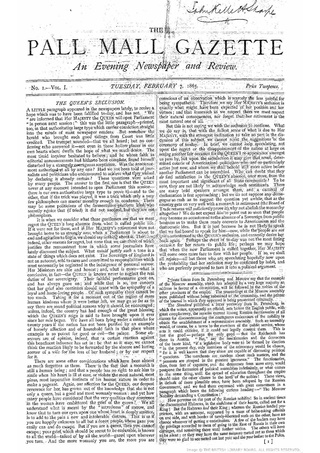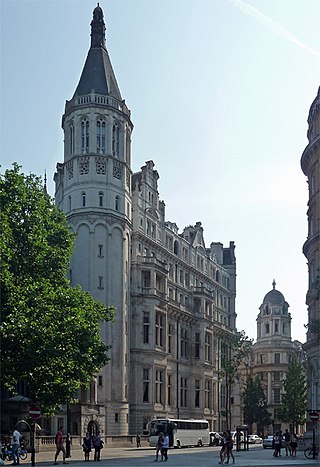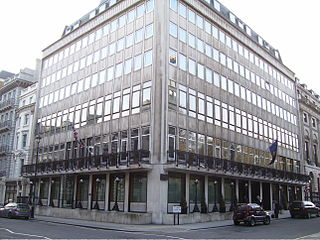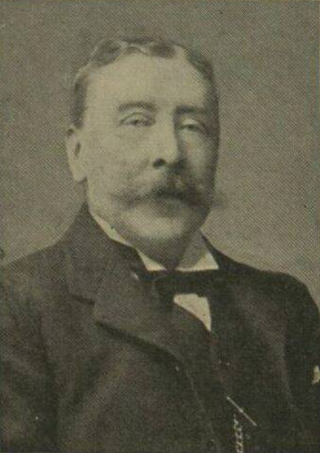Related Research Articles
The Liberal Unionist Party was a British political party that was formed in 1886 by a faction that broke away from the Liberal Party. Led by Lord Hartington and Joseph Chamberlain, the party established a political alliance with the Conservative Party in opposition to Irish Home Rule. The two parties formed the ten-year-long coalition Unionist Government 1895–1905 but kept separate political funds and their own party organisations until a complete merger between the Liberal Unionist and the Conservative parties was agreed to in May 1912.

Andrew Bonar Law was a British statesman and Conservative politician who was Prime Minister of the United Kingdom from October 1922 to May 1923.

The Royal Aero Club (RAeC) is the national co-ordinating body for air sport in the United Kingdom. It was founded in 1901 as the Aero Club of Great Britain, being granted the title of the "Royal Aero Club" in 1910.

The Pall Mall Gazette was an evening newspaper founded in London on 7 February 1865 by George Murray Smith; its first editor was Frederick Greenwood. In 1921, The Globe merged into The Pall Mall Gazette, which itself was absorbed into The Evening Standard in 1923.

The Carlton Club is a private members' club in the St James's area of London, England. It was the original home of the Conservative Party before the creation of Conservative Central Office. Membership of the club is by nomination and election only.

The National Liberal Club (NLC) is a London private members' club, open to both men and women. It was established by William Ewart Gladstone in 1882 to provide club facilities for Liberal Party campaigners among the newly enlarged electorate following the Third Reform Act in 1884, and was envisioned as a more accessible version of a traditional London club.

Boodle's is a gentlemen's club in London, England, with its clubhouse located at 28 St James's Street. Founded in January 1762 by Lord Shelburne, who later became Prime Minister of the United Kingdom and then 1st Marquess of Lansdowne, it is the second oldest private members' club in London and in the world.
The Guards Club, established in 1810, was a London Gentlemen's club for officers of the Guards Division, originally defined by the club as being the Coldstream Guards, Grenadier Guards or Scots Guards, traditionally the most socially elite section of the British Army. Officers of the Welsh and Irish Guards were not able to join until the second half of the 20th century. Its clubhouse at 70 Pall Mall was the first to be built on that street, which later became noted for its high concentration of clubs; earlier clubs had been focused on the adjoining St James's Street.

The Army and Navy Club in London is a private members' club founded in 1837 for British Army and Royal Navy Officers, it also known informally as The Rag. The Club offers Military membership to anyone who holds or has held a Commission in the British Armed Forces or in Commonwealth Forces, the club also now accepts applications for Non Military membership.
The Beaconsfield Club was a London gentlemen's club, now dissolved, which was established in 1880 and was disbanded circa 1887–8. For most of its existence, between 1880 and 1887, it occupied 66-68 Pall Mall, London.

The Junior Carlton Club was a London gentlemen's club, now dissolved, which was established in 1864 and was disbanded in 1977.
The Junior Constitutional Club was a political London gentlemen's club founded in 1887, and located at 101 Piccadilly. It was aligned to the Conservative party, with members having to pledge support. Heavy over-subscription for the Constitutional Club which had opened in 1883 led to the creation of a further mass-membership Conservative club.

The Cavalry and Guards Club is a London gentlemen's club, at 127 Piccadilly, situated next to the RAF Club.

The Athenaeum is a private members' club in London, founded in 1824. It is primarily a club for men and women with intellectual interests, and particularly for those who have attained some distinction in science, engineering, literature or the arts. Humphry Davy and Michael Faraday were the first chairman and secretary and 51 Nobel Laureates have been members.

The United Service Club was a London gentlemen's club founded in 1815 for the use of senior officers in the British Army and Royal Navy – those above the rank of Major or Commander – and the club was accordingly known to its members as "The Senior". The club closed in 1978.
The Junior Naval and Military Club was a short-lived London gentlemen's club, which existed between 1870 and 1879.

Colonel James Martin McCalmont was a British Army officer and Conservative, later Irish Unionist, politician.

The Home Rule movement was a movement that campaigned for self-government for Ireland within the United Kingdom of Great Britain and Ireland. It was the dominant political movement of Irish nationalism from 1870 to the end of World War I.
The St James's Gazette was a London evening newspaper published from 1880 to 1905. It was founded by the Conservative Henry Hucks Gibbs, later Baron Aldenham, a director of the Bank of England 1853–1901 and its governor 1875–1877; the paper's first editor was Frederick Greenwood, previously the editor of the Conservative-leaning Pall Mall Gazette.
References
- ↑ "ALLOCATION OF TIME". Parliamentary Debates (Hansard) . 10 October 1912.
- ↑ "Pall Mall, South Side, Past Buildings: Nos 66-68 (consec.) Pall Mall, The Junior Naval and Military Club | British History Online". www.british-history.ac.uk.